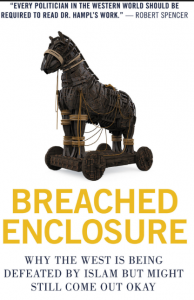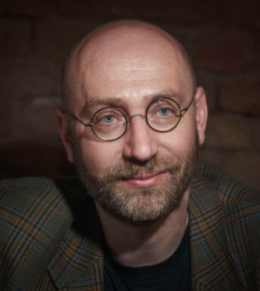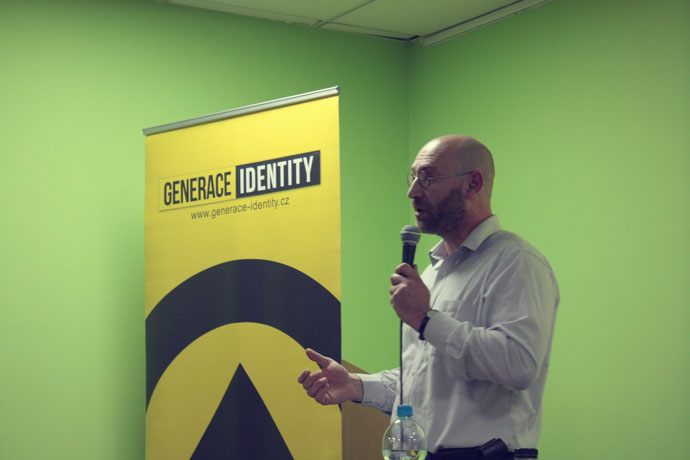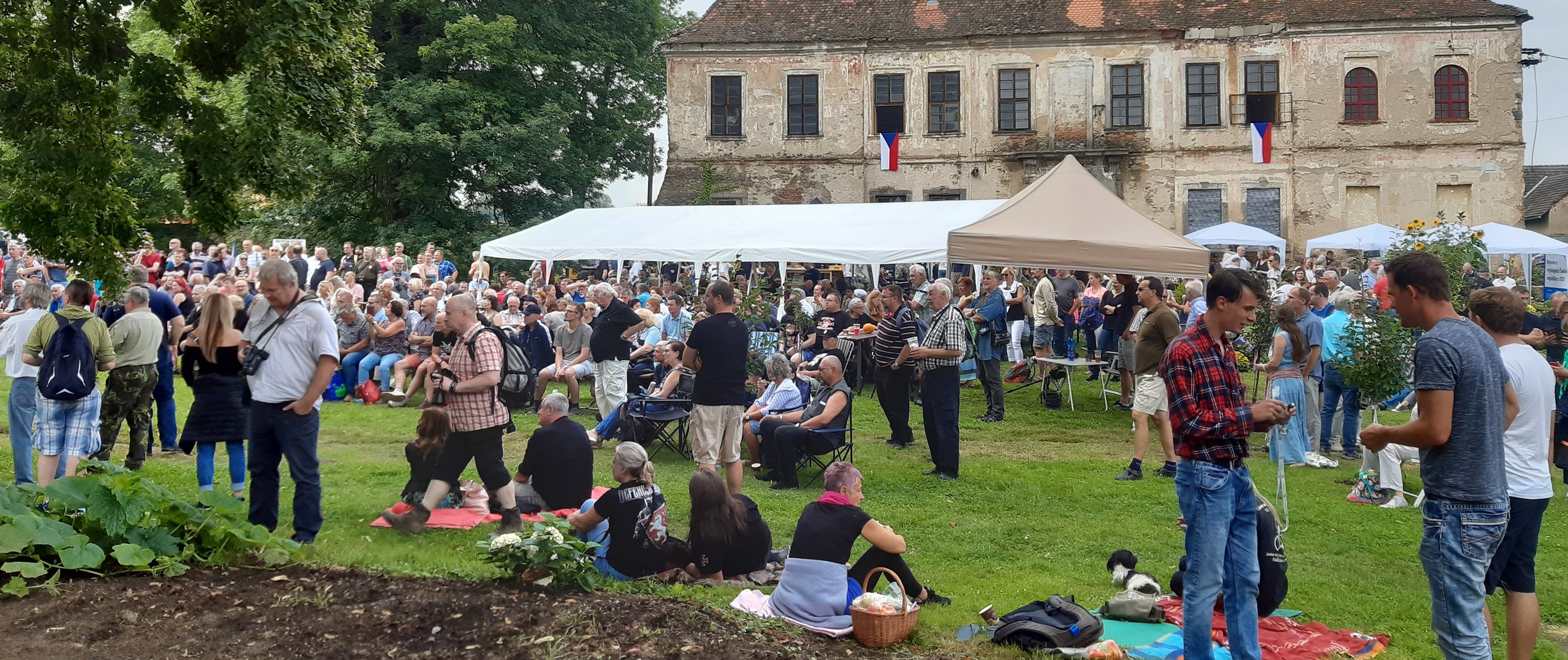Interview with Petr Hampl: Breached Enclosure & Redneck Sociology
Posted By Ondrej Mann On In North American New Right | Comments Disabled2,248 words
Petr Hampl [2] is the most widely read Czech sociologist. He is a patriot, activist, and the executive director of the Czech Society for Civilization Studies, which explores relations between “major civilizations” building on Samuel Huntington’s paradigm. He is also a co-founder of White Straight Pride Society. In 2018, Petr published his first book, Breached Enclosure: Why the West Is Being Defeated by Islam but Might Still Come Out Okay. This book, written and published in Czech, became a bestseller with over 17,000 copies sold. An English translation [3] of Breached Enclosure was recently published by Arktos, Hampl’s only available English translation. Later, Hampl also published a selection of essays under the title Fairness and Creativity: Chapters from Redneck Sociology (2019) and another book called Road from Serfdom (2020).
In his work, Petr has focused on the class conflict between the global multicultural elite and ordinary working people. However, Dr. Hampl paid his price. He is not allowed in mainstream media or to teach at university. Organizers of his public lectures are sometimes threatened. But he has become the most famous Czech sociologist with outreach to other countries as well.
We talked about his books, sociology, rednecks, his activities, life in post-communist countries, Friedrich A. Hayek’s philosophy, the future of the V4, the Hungarian way, and Generation Identity.
 [4]Ondrej Mann: How will you promote your book in English? I’ve seen your English website. Do you plan to make any series of memes with excerpts from your book or any interviews for media and reviews from famous persons?
[4]Ondrej Mann: How will you promote your book in English? I’ve seen your English website. Do you plan to make any series of memes with excerpts from your book or any interviews for media and reviews from famous persons?
Petr Hampl: The book is recommended by several influential personalities, including Jihad Watch’s Robert Spencer, members of the European parliament, a member of Bundestag, university professors, etc.
I was interviewed for the Warden Post and am preparing for other ones. My English site launched. I try to do as much as my limited time and resources allow me, but it is challenging for me as a completely unknown author from a small post-communist country. The good news is that all reader reviews on Amazon are five stars.
OM: Is it an advantage or disadvantage to come from a post-communist country?
PH: For marketing, it is bad, because I lack contact. But for bringing fresh ideas to the table, it may be an advantage. About a hundred years ago, thinkers from the former Austrian empire brought strong ideas into the English-speaking world, focusing on freedom and rationality. Names like Popper, Hayek, Wittgenstein, Mises, and Freud are still relevant. I believe something similar can happen again. There are some very interesting authors, especially in the Czech Republic and Poland. They combine political incorrectness with strong analytical skills.
OM: What is the main message of the book?
PH: In fact, it is tied together with Douglas Murray’s Strange Death of Europe and similar books. Often you read that Western civilization lost faith in its values. You read that it has no will to live anymore, that is it too tired. I agree, but as a sociologist, I need a deeper explanation. Why now and not 50 years ago? Why are there such huge differences between social classes in their view of migration, Islam, and civilizational values?
My thoughts on this topic resulted in this book. The “breached enclosure” is mainly about bureaucracy and class conflict. I claim that today’s situation is something unique in the history of the West. I also claim that today’s arrangement is highly destructive. It simply has to generate insanities such as multiculturalism and gender, whether we like it or not. It is out of control. I also claim that the West needs to undergo a radical change of economic and political system. Otherwise, it will be destroyed.
In some aspects, my analysis is close to Steve Bannon’s idea that the main evil is “big money, big media, big government.” [Alternative for Germany]’s Petr Bystron said that this book includes a clear answer to neo-Marxism. That includes a true populist social theory that underlies patriotic revolts against global elites.
OM: Will you publish your second book, The Road from Serfdom, in English?
PH: Actually, I believe that Road from Serfdom is an even better book. But the readers should understand the basic ideas of Breached Enclosure before approaching the second book. Now I need to concentrate on the promotion of the first one.
OM: What is your relationship to Friedrich A. Hayek’s philosophy?
PH: When I was 25, I was a frenetic fan of F. A. Hayek, like most of my friends, young educated Czechs living in big cities, and like our idol, Czech prime minister Vaclav Klaus. I still have several of Hayek’s books in my bookcase, and I still find great ideas there.
However, each idea must be confronted with empiric reality. And here, Hayek failed. As soon as states terminated their intervention into “free society,” no “spontaneous order” came. The power of states has only been replaced by the power of corporations. People are less free than before, and they became impoverished. As I wrote in Serfdom: “Although F. A. Hayek was a great man; his directions brought serfdom worse than the one he warned against. The core of his teaching is based on a tragic mistake.”
OM: You moved from libertarianism to patriotism and partly to the patriotic or conservative Left. Have you noticed similar transitions from libertarianism to nationalism?
PH: This transition is typical for the entire social group. Many of my friends from my generation went a similar way. We have never been hardcore religious conservatives — just ordinary people who love freedom and want to live independently. Often well-educated. Facing Islam, we started to understand that our intellectual stances were naive and that libertarianism is useless. We are much closer to the conservative or nationalist Left than global market liberalism.
I am afraid that people in other parts of the world don’t know that this unique mixture of nationalism, social conservatism, and state socialism was typical for late Soviet regimes and can still be replicated. Worker parties in the UK, France, Germany, and other countries are polluted with neo-Marxism.
OM: Weren’t late Soviet regimes rather Marxist?
PH: Not at all. There were some pictures of Karl Marx, but nobody took it seriously. I grew up under an authoritative regime that tried to build a copy of the American fifties: Conservative family life supported by the state, worker houses on city outskirts, swing music on state television… Do you know that communist big guys drove a Packard Caribbean? In the Soviet Union, it was produced under the brand “Tchaika.”
OM: Is it possible to repeat the Hungarian way in other EU countries? Especially in V4 countries?
PH: Orbán’s revolution succeeded before the new social structure was formed fully. It would be much more difficult now — as we see in Poland — but it is still possible. I believe that the COVID epidemic was a chance. The states were in disarray and the ruling class confused, but patriotic movements were not ready. Viktor Orbán did tremendous work before gaining power in 2010. Nobody else did.
I am afraid for countries such as the UK and Germany, the change is not possible anymore. They will continue up to the collapse.
OM: What does patriotic politics need the most?
PH: Understanding what really happens. It was the key difference between Orbán and Trump. Orbán was elected and immediately attacked globalist power structures in Hungary. He went up to temporary seizing of banks from abroad.
Trump often complained about injustice, unfairness, and the moral failing of particular people, mainly in the media. I am afraid he did not catch that the evil is in entire systems of the global free market, including big tech, banks, universities, big media, the free movement of capital, etc. He did not understand he feeds the beasts by decreasing corporate taxes. Fighting particular battles has no use if you are not ready to attack the system.
Many conservatives advocate freedom for corporations, banks, and the military-industrial complex. The same people are surprised that neo-Marxism is winning. It is crazy.
OM: What does the patriotic movement lack the most?
PH: Understanding the old worker socialism is an ally, not an enemy.
OM: Is it possible to be a patriot in the Czech Republic and to be in the mainstream? You are the best-selling sociologist in the Czech Republic.
PH: Definitely not for me. I have no access to mainstream media. I am not allowed to give lectures at universities anymore. Restaurant owners who offer rooms for my meetings with readers are contacted and threatened by activists. On the other hand, I have many supporters, including some members of parliament and the spokesman of the Czech president.
Under such a situation, I wrote two bestsellers. I believe that if I had full access to the market, I would see five times more, and I would be a rich man now. But generally, I love this life of a maverick.
OM: How would you describe your “redneck sociology?” Are there any rednecks in the Czech Republic? In 2019, you published in Czech a book of your essays under the title Fairness and Creativity: Chapters from Redneck Sociology.
PH: A redneck is someone who is not afraid to ask politically incorrect questions and is willing to accept politically incorrect answers.
Redneck sociology is a combination of full-fledged academic sociology, working-class instinct, and political incorrectness.
OM: Are there any rednecks in the Czech Republic?
PH: The Czech Republic misses a culture of proud rednecks simply because we lack experience with deep class division. A generation ago, the Czech nation was relatively uniform. There were some big cheeses, some intellectuals, some agricultural workers, but there was no deep division between them. We are a small nation.
The deeper class division came only with international corporations. Creating identities of proud rednecks is at the very beginning.
OM: Why do you support the Czech branch of Generation Identity?
PH: Many young people see just a single way of understanding life. It is the case especially for young educated people living in cities. You have to become a corporate citizen. You have to become a part of the corporate world. You have to endeavor to become a member of the global elite. You have to despise your nation — there is no other way.
It is suitable for corporate profits. It is bad for the world, and it is bad for the life chances of these young people. The world of corporations provides nothing but limitless competition and fear that accountants in headquarters will compute that you don’t bring sufficient profit. Youth enthusiasm changes in helplessness and despair easily.
Alternatives must exist. Generation Identity offers such an alternative. Clever, educated young people demonstrate that other ways of thinking and different ways of life are possible.
OM: What can a common man do for the future of his own country?
PH: The first Czech president Masaryk often said that small everyday work is much more important than revolutions. He was true. The critical part of the work is always done in periods before significant changes. Revolutions mostly confirm and demonstrate the power shift that already happened. Today, everyday work decides significant changes in the future.
Viktor Orbán spent several years building a network of local groups and their own media before he took over power in Hungary. I would like to add studying, too: mathematics, natural sciences, something from the humanities. Knowledge is power. Too much knowledge is owned by elites. Common people must regain it.
And the support of self-supplying and local networks.
OM: What is your White Straight Pride Society?
PH: In the beginning, it was just a joke. We established and registered a politically incorrect non-profit group. At our meetings, we drunk a beer and laughed at feminists. And some VIPs, including university professors and former ministers of the Czech government, visited us. From time to time, a “gender expert” came and was crying at us hysterically. We had a lot of fun.
But the times are changing. Now we are an enemy of the state for doing what was okay a few years ago. But we found that challenging the system directly is still fun. And in the Czech Republic, people have more freedom than in Western Europe.
OM: What is the Patriotic Meeting in Příčovy? Have you noticed similar events abroad?
PH: Patriotic Meeting is a summer meeting of members of all ideological streams that adhere to patriotism. Several hundred people, music, lectures, books, personal meetings, a friendly atmosphere. It takes place in the gardens of Příčovy Castle. Somebody calls it “patriotic Woodstock.”
As far as I know, there is no similar event in Western Europe. In the Czech Republic, we follow the tradition of mass meetings typical of the emergent Czech nationalism in the 19th century.
OM: Are you promoting a wide patriotic coalition with pro-white Leftists, libertarians, conservatives, and radicals?
PH: Yes and no. Coalitions are created for a single battle or a single war. Coalitions are not for long-term relationships. It makes no sense to spend the energy of integrating different movements. It will not work anyway. The lesson learned from history is clear.
Let each movement build its structure. Let each movement strengthen and grow. Let there be personal contacts between them. Let each of them avoid insults and behavior that prevent future cooperation. One day, the time for creating a coalition will come. But not now.
* * *
Don’t forget to sign up [7] for the weekly email Counter-Currents Newsletter for exclusive content, offers, and news.


